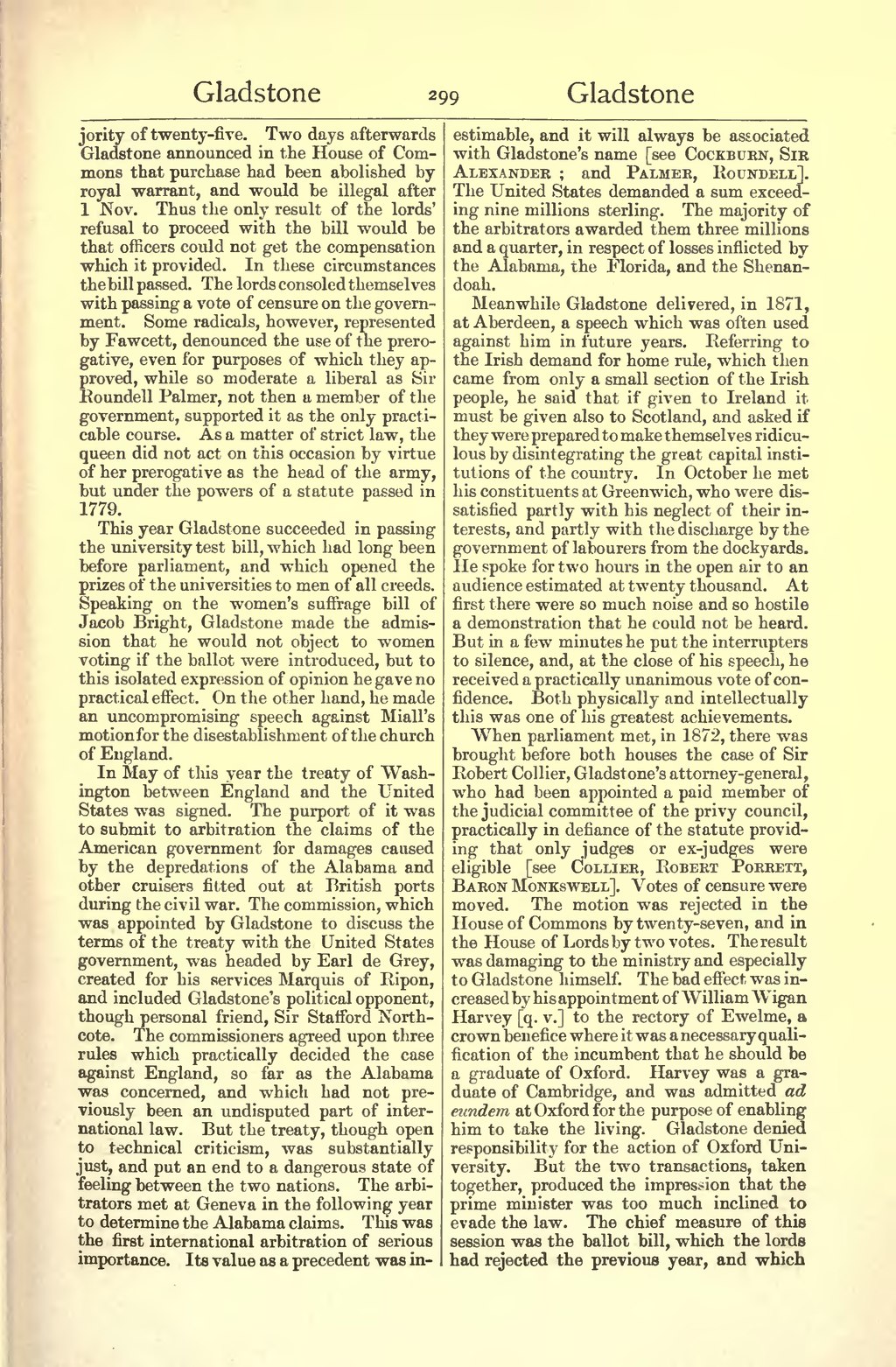jority of twenty-five. Two days afterwards Gladstone announced in the House of Commons that purchase had been abolished by royal warrant, and would be illegal after 1 Nov. Thus the only result of the lords' refusal to proceed with the bill would be that officers could not get the compensation which it provided. In these circumstances the bill passed. The lords consoled themselves with passing a vote of censure on the government. Some radicals, however, represented by Fawcett, denounced the use of the prerogative, even for purposes of which they approved, while so moderate a liberal as Sir Roundell Palmer, not then a member of the government, supported it as the only practicable course. As a matter of strict law, the queen did not act on this occasion by virtue of her prerogative as the head of the army, but under the powers of a statute passed in 1779.
This year Gladstone succeeded in passing the university test bill, which had long been before parliament, and which opened the prizes of the universities to men of all creeds. Speaking on the women's suffrage bill of Jacob Bright, Gladstone made the admission that he would not object to women voting if the ballot were introduced, but to this isolated expression of opinion he gave no practical effect. On the other hand, he made an uncompromising speech against Miall's motion for the disestablishment of the church of England.
In May of this year the treaty of Washington between England and the United States was signed. The purport of it was to submit to arbitration the claims of the American government for damages caused by the depredations of the Alabama and other cruisers fitted out at British ports during the civil war. The commission, which was appointed by Gladstone to discuss the terms of the treaty with the United States government, was headed by Earl de Grey, created for his services Marquis of Ripon, and included Gladstone's political opponent, though personal friend, Sir Stafford Northcote. The commissioners agreed upon three rules which practically decided the case against England, so far as the Alabama was concerned, and which had not previously been an undisputed part of international law. But the treaty, though open to technical criticism, was substantially just, and put an end to a dangerous state of feeling between the two nations. The arbitrators met at Geneva in the following year to determine the Alabama claims. This was the first international arbitration of serious importance. Its value as a precedent was inestimable, and it will always be associated with Gladstone's name [see Cockburn, Sir Alexander; and Palmer, Roundell]. The United States demanded a sum exceeding nine millions sterling. The majority of the arbitrators awarded them three millions and a quarter, in respect of losses inflicted by the Alabama, the Florida, and the Shenandoah.
Meanwhile Gladstone delivered, in 1871, at Aberdeen, a speech which was often used against him in future years. Referring to the Irish demand for home rule, which then came from only a small section of the Irish people, he said that if given to Ireland it must be given also to Scotland, and asked if they were prepared to make themselves ridiculous by disintegrating the great capital institutions of the country. In October he met his constituents at Greenwich, who were dissatisfied partly with his neglect of their interests, and partly with the discharge by the government of labourers from the dockyards. He spoke for two hours in the open air to an audience estimated at twenty thousand. At first there were so much noise and so hostile a demonstration that he could not be heard. But in a few minutes he put the interrupters to silence, and, at the close of his speech, he received a practically unanimous vote of confidence. Both physically and intellectually this was one of his greatest achievements.
When parliament met, in 1872, there was brought before both houses the case of Sir Robert Collier, Gladstone's attorney-general, who had been appointed a paid member of the judicial committee of the privy council, practically in defiance of the statute providing that only judges or ex-judges were eligible [see Collier, Robert Porrett, Baron Monkswell]. Votes of censure were moved. The motion was rejected in the House of Commons by twenty-seven, and in the House of Lords by two votes. The result was damaging to the ministry and especially to Gladstone himself. The bad effect was increased by his appointment of William Wigan Harvey [q. v.] to the rectory of Ewelme, a crown benefice where it was anecessary qualification of the incumbent that he should be a graduate of Oxford. Harvey was a graduate of Cambridge, and was admitted ad eundem at Oxford for the purpose of enabling him to take the living. Gladstone denied responsibility for the action of Oxford University. But the two transactions, taken together, produced the impression that the prime minister was too much inclined to evade the law. The chief measure of this session was the ballot bill, which the lords had rejected the previous year, and which
